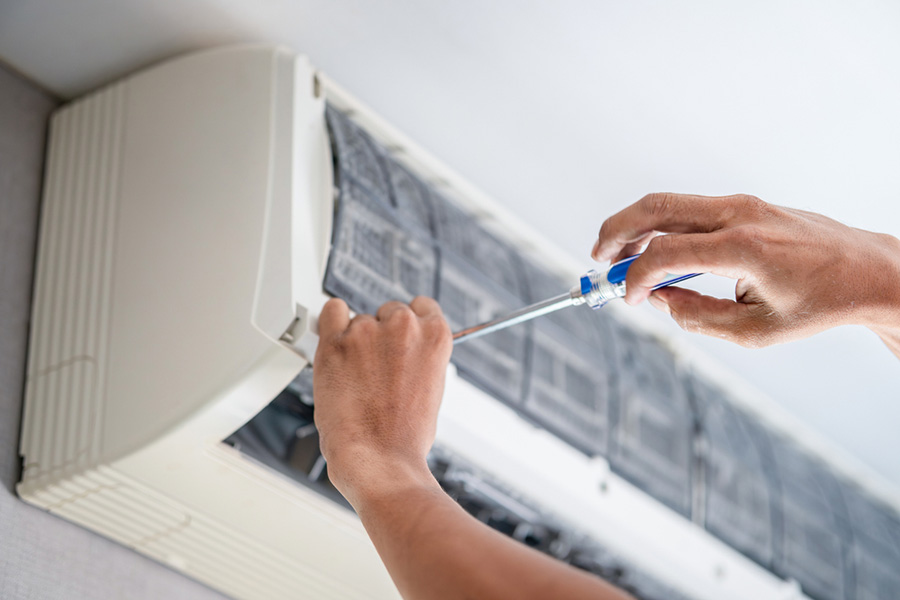Serving Nashville and the Middle Tennessee Area

The Maynard Man Explains Short-Cycling and Why it’s Bad News for Your AC
Does your HVAC system, (air conditioner), (HREF TITLE=”Air Conditioning Service Company in Tennessee”) keep switching on and off every few minutes without ever really cooling your home? That might seem like it’s just working hard, but it’s actually a sign of a bigger issue called short-cycling. This pattern of rapid starts and stops doesn’t just reduce comfort—it puts serious stress on your system. The Maynard Man is here to explain what short-cycling is, why it happens, and how it could lead to higher bills or even early AC failure. With the right knowledge and a few simple steps, you can catch this issue early and keep your system running efficiently. Let’s take a closer look at why short-cycling is bad news—and what you can do about it.
What Is Short-Cycling?
Short-cycling is when your air conditioner turns on, runs for a very short time, and then shuts off—only to repeat the cycle again minutes later. Instead of completing a full cooling cycle, the system keeps restarting before it’s had a chance to do its job. That means your home never reaches a consistent temperature, and your AC ends up working much harder than it should. This isn’t just a nuisance—it’s a sign that something inside your HVAC system, and your air conditioning isn’t functioning properly, you need AC repair(HREF Title=”AC Repair service companies in Nashville, Tennessee”). Whether it’s an airflow issue, a refrigerant imbalance, or an equipment mismatch, short-cycling is a problem that needs attention.
Why Is Short-Cycling Bad for Your AC?
Short-cycling might seem like a minor issue, but it can cause major damage if left unchecked. Every time your AC starts up, it draws a surge of electricity—so when it cycles frequently, it uses more energy and drives up your utility bills. That stop-and-start pattern also puts extra stress on components like the compressor and fan motor, which can wear out faster under constant strain. The biggest risk? System failure. If your AC is constantly short-cycling, it’s not just inefficient—it’s on the fast track to a breakdown. Over time, what starts as a small cycling issue can lead to expensive repairs or even the need for a full replacement. That’s why early intervention is so important.
What Causes Short-Cycling?
Several factors can cause an air conditioner to short-cycle. Identifying the source is the key to fixing the issue effectively. Let’s take a closer look at the most common culprits:
Oversized AC Units
If your air conditioner is too large for your home, it will cool the space too quickly and shut off before completing a full cycle. While this may sound efficient, it actually leads to poor humidity control, uneven temperatures, and more wear on your system from frequent starts and stops.
Low Refrigerant Levels
When your AC is low on refrigerant—often due to a leak—it can’t maintain the right pressure in the cooling cycle. This imbalance causes the system to shut down prematurely, resulting in short-cycling that won’t go away until the refrigerant issue is resolved.
Dirty Air Filters or Coils
Clogged filters and dirty evaporator or condenser coils restrict airflow and force your system to overheat. When the system senses that something is wrong, it shuts down early as a safety precaution. Without proper cleaning, this cycle just keeps repeating.
Thermostat Problems
A malfunctioning thermostat or one that’s placed too close to a vent or window can confuse your system into thinking the house is cooler than it really is. That can cause the AC to shut off too soon—even when your living space is still warm.
How to Fix Short-Cycling
The good news is that short-cycling can often be fixed—especially when it’s caught early. Start with the basics: check and replace your air filter if it’s dirty, and make sure your thermostat is functioning properly and located in a central, shaded area. These simple steps can often solve minor cycling issues. If that doesn’t do the trick, it’s time to call in a professional. An HVAC technician can inspect refrigerant levels, clean the evaporator and condenser coils, and test for electrical or sensor problems that might be causing premature shutdowns. If your system is oversized or nearing the end of its life, they can also recommend whether an upgrade is the smartest long-term solution. Addressing the root cause now can help you avoid major repairs down the line.
Wrap-Up: Get Ahead of AC Trouble with the Maynard Man
Short-cycling might seem like a small inconvenience, but it’s often a sign that your AC system is struggling—and it won’t fix itself. Whether it’s a dirty filter, refrigerant issue, or an oversized unit, ignoring the problem can lead to higher energy bills, worn-out components, and early system failure. The Maynard Man is here to help you stop the cycle before it turns into a breakdown. Contact Maynard Plumbing, Heating, Cooling (HREF Title= “Plumber Near Me”). Maynard Plumbing, Heating, Cooling”) to schedule a full AC inspection and get expert solutions that keep your system running smoothly, efficiently, and reliably all season long.
Recent News
Preventing HVAC Failure: Preparing Your Heating System for Tennessee’s Winter “Deep Freezes”
How to Protect Your Pipes from Freezing During Cold Weather in Nashville
5 Signs Your Water Heater Needs Repair Before Winter Arrives in Nashville
How Regular Drain Cleaning Can Prevent Costly Plumbing Emergencies
High-ROI Home Improvements in Nashville
Energy Efficiency & Indoor Air Quality Blueprint for Tennessee Homes
Home Heating and Cooling Options: Ductless, Mini Split, and Heat Pump Explained
Schedule Service


